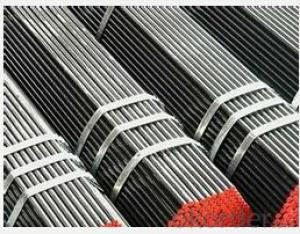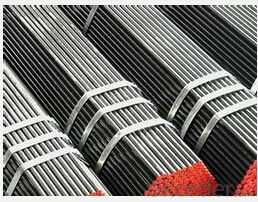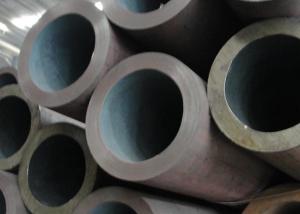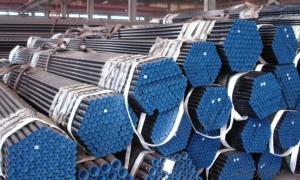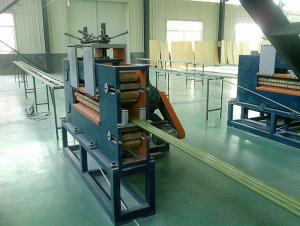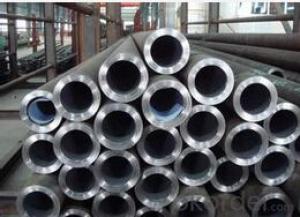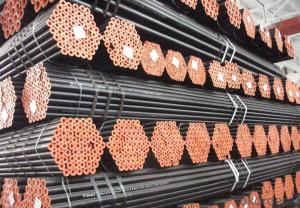Seamless steel tubes for high-pressure chemical fertilizer
- Loading Port:
- China Main Port
- Payment Terms:
- TT OR LC
- Min Order Qty:
- -
- Supply Capability:
- -
OKorder Service Pledge
OKorder Financial Service
You Might Also Like
Seamless steel tubes for high-pressure chemical fertilizer processmg equipmentStandard: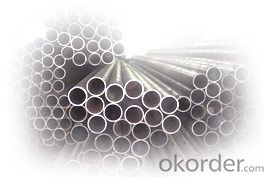
GB6479 Chinese national standard
Application:
Seamless steel tubes for high-pressure chemical fertilizer processing equipment and pipelines thereof
Model No.of steel tubes:
10、20、16Mn、10MoWVNb、15CrMo、1Cr5Mo、12 Cr2Moetc
.Diamensional tolerances:
|
|
| ||
Cold-rolled tubes | Tube sizes(mm) | Tolerances(mm) | Tube sizes (mm) | Tolerances(mm) |
>30~50 | ±0.3 | ≤30 | ±10% | |
>50~219 | ±0.8% | |||
Hot-rolled tubes | >219 | ±1.0% | >20 | ±10% |
Mechanical properties:
标准 | 牌号 | 抗拉强度(MPa) | 屈服强度(MPa) | 伸长率(%) | 冲击功(J) | 低温冲击Akv |
GB6479 | 10 | 335~490 | ≥205 | ≥24 | / | -20℃≥18 |
20 | 410~550 | ≥245 | ≥24 | ≥39 | -20℃≥18 | |
16Mn | 490~670 | ≥320 | ≥21 | ≥47 | -40℃≥21 | |
10MoWVNb | 470~670 | ≥295 | ≥19 | ≥62 | ||
15CrMo | 440~640 | ≥235 | ≥21 | ≥47 | ||
1Cr5Mo | 390~590 | ≥195 | ≥22 | ≥94 | ||
12 Cr2Mo | 450~600 | ≥280 | ≥20 | ≥38 |
Chemical composition:
Standard codes | Models of steel tubes | Chemical compositions(%) | |||||||
C | Si | Mn | P | S | Cr | Mo | Ni | ||
GB 6479 | 10 | 0.07~0.14 | 0.17~0.37 | 0.35~0.65 | ≤0.030 | ≤0.030 | / | / | / |
20 | 0.17~0.24 | 0.17~0.37 | 0.35~0.65 | ≤0.030 | ≤0.030 | / | / | / | |
16Mn | 0.12~0.20 | 0.20~0.60 | 1.20~1.60 | ≤0.030 | ≤0.030 | ||||
10MoWVNb | 0.07~0.13 | 0.50~0.80 | 0.50~0.80 | ≤0.030 | ≤0.030 | / | 0.60~0.90 | / | |
15CrMo | 0.12~0.18 | 0.17~0.37 | 0.40~0.70 | ≤0.030 | ≤0.030 | 0.80~1.10 | 0.40~0.55 | / | |
1Cr5Mo | ≤0.15 | ≤0.50 | ≤0.60 | ≤0.030 | ≤0.030 | 4.00~6.00 | 0.45~0.60 | ≤0.60 | |
12 Cr2Mo | 0.80~0.15 | ≤0.50 | 0.40~0.70 | ≤0.030 | ≤0.030 | 2.0~2.50 | 0.90~1.20 | ||
NOTE:the residual contents of the elements for the steel 10:Ni≤0.25%、Cr≤0.15%、Cu≤0.20%
the residual contents of the elements for the steel 20:Ni≤0.25%、Cr≤0.25%、Cu≤0.20%、Mo≤0.15%、V≤0.08%
the residual contents of the elements for the steel Ni≤0.30%、Cr≤0.30%、Cu≤0.20%
- Q: How do steel pipes handle vibrations?
- The effectiveness of handling vibrations is a well-known attribute of steel pipes. Their strong and rigid nature enables them to withstand various types of vibrations, including mechanical vibrations and seismic activities. The structural integrity and strength of steel pipes are responsible for their resilience. Steel pipes possess high tensile strength, which allows them to resist deformation or breakage when exposed to vibrations. They also exhibit resistance to fatigue, meaning they can endure repeated vibrations without suffering significant damage. This quality makes steel pipes ideal for applications involving constant or cyclic vibrations, such as in industrial settings or for fluid transportation through pipelines. Furthermore, steel pipes have the added advantage of being able to dampen vibrations due to their mass. The weight of the steel pipe aids in absorbing and dissipating the energy generated by vibrations, preventing excessive movement or oscillation. This damping effect contributes to the overall stability and durability of the pipe system. Various measures can be taken to further enhance the ability of steel pipes to handle vibrations. These measures may include the utilization of vibration isolators or dampers, which are devices designed to reduce the transmission of vibrations from the surrounding environment. Additionally, proper installation techniques and regular maintenance can help ensure that steel pipes continue to function optimally under conditions prone to vibrations. In conclusion, steel pipes possess the necessary attributes to effectively handle vibrations, including strength, resistance to fatigue, and the ability to dampen vibrations. Their robustness and durability make them a reliable choice for applications where vibrations are a concern, guaranteeing the safe and efficient transportation of fluids or materials.
- Q: Difference between cold rolled steel pipe and common steel pipe
- 3, the caliber of cold-rolled steel tube is smaller than that of hot rolled steel tube4, from the price point of view, cold-rolled steel pipe is 1000-2000 tons more expensive than hot-rolled steel pipe
- Q: Are steel pipes suitable for solar power plants?
- Yes, steel pipes are suitable for solar power plants. Steel pipes are often used in the construction of solar power plants due to their durability, strength, and resistance to corrosion. They can be used for various purposes in a solar power plant, including the transportation of fluids such as water or heat transfer fluids, as well as providing structural support for solar panels and other equipment. Steel pipes are capable of withstanding high temperatures and pressure, making them ideal for the efficient operation of solar power plants. Additionally, steel pipes are readily available and cost-effective, making them a popular choice in the construction of solar power plants.
- Q: How are steel pipes classified based on pressure ratings?
- Steel pipes are classified based on pressure ratings into various categories such as Schedule 40, Schedule 80, and Schedule 160, with each schedule indicating the maximum pressure the pipe can withstand.
- Q: How are steel pipes protected against internal corrosion?
- Steel pipes are protected against internal corrosion through various methods, such as applying protective coatings or linings to the inner surface of the pipes. These coatings act as a barrier between the steel surface and the corrosive elements present in the transported fluids. Additionally, cathodic protection can be employed, where a sacrificial anode or an impressed current system is used to prevent corrosion by diverting the electrical current away from the steel surface. Regular maintenance and monitoring are also crucial to ensure the ongoing protection of steel pipes against internal corrosion.
- Q: Can steel pipes be used for underground water supply networks?
- Yes, steel pipes can be used for underground water supply networks. Steel pipes are commonly used for underground water supply networks due to their durability, strength, and resistance to corrosion. They can withstand high pressure and are able to handle the weight of the soil and other external forces. Additionally, steel pipes are available in various sizes and can be easily welded, making them suitable for different water supply system requirements. However, it is important to take into consideration factors such as the quality of the soil, the presence of chemicals or corrosive substances, and the need for regular maintenance to ensure the longevity and efficiency of the steel pipes in underground water supply networks.
- Q: What industries typically use steel pipes?
- Industries such as construction, oil and gas, water treatment, automotive, and manufacturing typically use steel pipes.
- Q: Can steel pipes be used for underground drainage?
- Yes, steel pipes can be used for underground drainage. Steel pipes are commonly used for underground drainage systems due to their durability, strength, and resistance to various elements, such as soil erosion, chemical corrosion, and high pressure. However, it is important to consider factors like the type of soil, environmental conditions, and the specific requirements of the drainage system before deciding on the material for underground drainage pipes.
- Q: What are the different types of steel pipe coatings for offshore applications?
- There are several types of steel pipe coatings commonly used for offshore applications. These include fusion bonded epoxy (FBE) coatings, polyethylene (PE) coatings, polypropylene (PP) coatings, and three-layer polyethylene (3LPE) or polypropylene (3LPP) coatings. Each coating has its own unique properties that make it suitable for specific offshore conditions and requirements.
- Q: What is the maximum temperature that steel pipes can handle?
- The maximum temperature that steel pipes can handle depends on the specific grade of steel being used. However, most common steel pipes can withstand temperatures up to around 1000 degrees Celsius (1832 degrees Fahrenheit) without significant structural damage.
Send your message to us
Seamless steel tubes for high-pressure chemical fertilizer
- Loading Port:
- China Main Port
- Payment Terms:
- TT OR LC
- Min Order Qty:
- -
- Supply Capability:
- -
OKorder Service Pledge
OKorder Financial Service
Similar products
Hot products
Hot Searches
Related keywords
